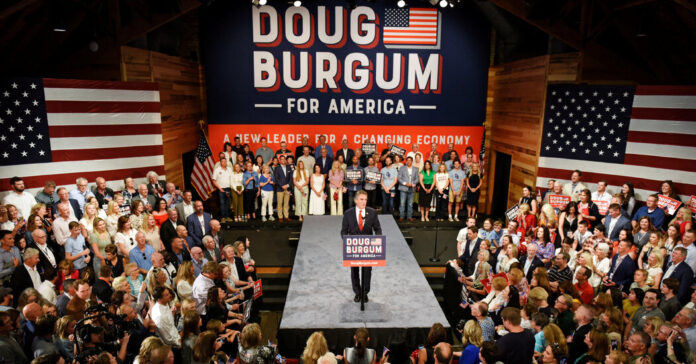How much is a dollar worth?
To Gov. Doug Burgum of North Dakota, quite a lot.
Mr. Burgum is one of several Republican presidential candidates going to great lengths to reach a crucial threshold to qualify for the party’s first primary debate on Aug. 23 — the requirement that only candidates with at least 40,000 individual donors to their campaigns will be allowed on the stage.
A long-shot contender at the bottom of recent polls, Mr. Burgum is offering $20 gift cards to the first 50,000 people who donate at least $1 to his campaign. And one lucky donor, as his campaign advertised on Facebook, will have the chance to win a Yeti Tundra 45 cooler that typically costs more than $300 — just for donating at least $1. The unusual offer was earlier reported by FWIW, a newsletter that tracks digital politics.
Mr. Burgum’s push to prioritize donors over actual dollars is a sign of some candidates’ desperation to make the debate stage and to seize some of the national spotlight from the Republican front-runner, former President Donald J. Trump, and his top rival, Gov. Ron DeSantis of Florida.
Former Gov. Chris Christie of New Jersey, another Republican candidate, recently ended a campaign ad with a direct plea that flashed on the screen to “Donate today, get Chris Christie on the debate stage.”
Mr. Burgum’s campaign acknowledged that its requests were directly tied to the debate and spun the gift-card giveaways into attacks on President Biden.
“Doug knows people are hurting because of Bidenflation, and giving Biden Economic Relief Gift Cards is a way to help 50,000 people until Doug is elected President to fix this crazy economy for everyone,” said Lance Trover, a spokesman for the Burgum campaign.
Mr. Trover added that the efforts allowed the campaign to “secure a spot on the debate stage while avoiding paying more advertising fees to social media platforms who have owners that are hostile to conservatives.”
Kyle Tharp, the author of the FWIW newsletter that reported on the solicitations, said that as part of his reporting process, he had donated $1 to the Burgum campaign. He did not receive any follow-up information about how he would receive the gift card, he said. The campaign later clarified on Twitter that 50,000 donors would receive a Visa or Mastercard gift card to their mailing address.
The campaign did not respond to a request for comment about how many donors had contributed so far.
The campaign’s donations-for-cash strategy could raise potential legal concerns, said Paul Ryan, a campaign finance lawyer. Voters who make donations in exchange for gift cards, he said, might be considered straw donors because part or all of their donations are being reimbursed by the campaign.
“Federal law says ‘no person shall make a contribution in the name of another person,’” Mr. Ryan said. “Here, the candidate is making a contribution to himself in the name of all these individual donors.”
Richard L. Hasen, a law professor at the University of California, Los Angeles, who specializes in election law, said that typically, campaigns ask the Federal Election Commission when engaging in new forms of donations.
The Burgum campaign’s maneuver, he said, “certainly seems novel” and “raises concerns about whether it violates the prohibition on straw donations.”
But some of the legal uncertainty, Mr. Hasen added, stems from the fact that “functionally, campaigns spend a lot of money to get small donations, especially in cases like this where they’re trying to reach a debate threshold.”
Mr. Burgum isn’t alone in using his immense wealth — he’s a billionaire former software executive — to bolster his campaign.
Perry Johnson, a businessman who also announced a hopeful bid for the Republican presidential nomination and who ran for Michigan governor last year, has spent $80,000 to $90,000 on ads promoting $1 hats that read, “I identify as ‘Non-Bidenary,’” Facebook records show. His campaign said in a recent ad that it had reached 10,000 donors.
To qualify for the first presidential debate, candidates must have a minimum of 200 unique donors per state or territory in 20 states and territories, according to the Republican National Committee, which set the rules. They must also garner at least 1 percent in multiple national or early-voting state polls recognized by the committee.
Shane Goldmacher contributed reporting.



